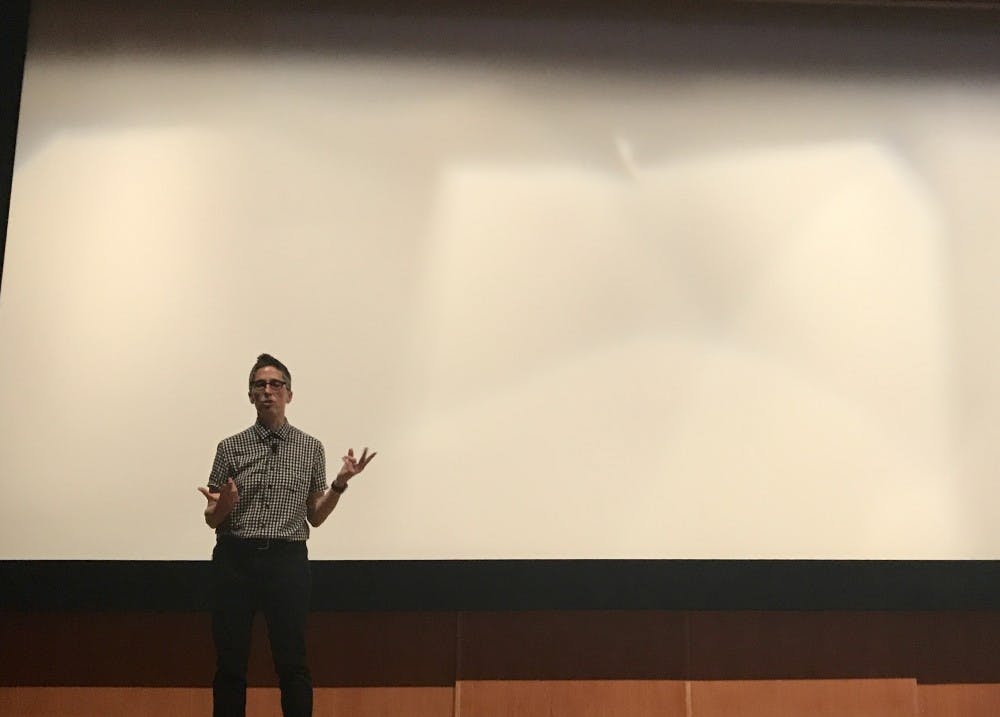The namesake of the Bechdel test, a familiar feminist film metric, took the stage in McCosh 10 yesterday. In an Oct. 9 lecture, acclaimed cartoonist Alison Bechdel discussed her creative process as a queer memoirist.
Bechdel is the author of “Dykes to Watch Out For,” a lesbian comic strip where the Bechdel Test originated. Her graphic novel-turned-Broadway musical “Fun Home: A Family Tragicomic” was the recipient of multiple Tony awards.
Bechdel’s lecture was accompanied by a series of visuals documenting her evolution as an artist. She began the lecture with photographs of childhood drawings and a discussion of her obsessive compulsive disorder — two factors which motivated her to become a cartoonist. She emphasized that much of her creative material came from her lived experiences: the discovery of her sexuality and coming out, her strained relationship with her mother, and the likely suicide of her closeted father.
“I think damage and gift go together. Creativity is often a symptom and a cure,” Bechdel said. “Gradually [my work] became sort-of a diary. I became a character, and it became a reflection of what was going on in my life at the time.”
Bechdel said she started cartooning as a coping mechanism for her compulsions. As a child, she had an intense fear of inadvertently lying, which inspired her to write down extensive records of her life in her diaries.
“There’s some part of myself that’s missing that I’m trying to compensate for by keeping this scrupulous account of my existence,” she said.
Bechdel said that her fear stemmed from a deep family secret: that her father had been having affairs with other men, including some of his high school students. In the midst of the familial secrecy and lies, Bechdel found authenticity in her comics.
“Languages could be unreliable and appearances could be deceiving,” she said. “If you triangulate between those two courses then maybe you get a little closer to the truth than you could with one of them on their own.”
Her graphic memoir “Fun Home” follows this journey from childhood to adulthood within the context of her dysfunctional family. Set in her family’s funeral home, the work explores the seemingly opposing themes of death and coming-of-age. According to Bechdel, depicting her parents as characters helped her to understand them and her family dynamic more deeply.
But Bechdel’s aims extended beyond her own personal storytelling. Her cartoon strip “Dykes to Watch Out For” took off in 1983, in the midst of the AIDS crisis and a renewed anti-gay movement in the United States.
“For a long time, I had to find myself as a lesbian cartoonist. I think that’s really important — being a lesbian was part of my mission,” she explained.
Bechdel spoke of her aspirations for queer representation in the media.

“I did not see myself reflected in the cultural mirror,” she said. “I wanted to see images of people who looked like me and my friends. So I decided I would just start making them myself.”
Bechdel said she viewed her outsiderness not as a hindrance, but rather as an advantage — a path to objectivity in her work. Her cartoons took on social commentary from a unique perspective.
Between 1983 and 2008, as Bechdel was writing “Dykes to Watch Out For,” she noted a shift in the public perception of queerness.
“The separate subculture that I had been a part of growing up in the ’80s and ’90s was disappearing, mostly because of our own success,” she said. “It was no longer needed to have this separate world of women’s book stores and gay bars. All those things were closing and those were the things that supported me.”
Throughout the cultural shifts, cartooning helped Bechdel to make sense of the world around her. While she acknowledged that one of the “pitfalls of being a memoirist” was becoming more focused on writing about life than actually living it, she argued writing allows one to step back from “the real thing” to be more present.
The talk, sponsored by the Spencer Trask Lecture Series, took place at 6 p.m. in McCosh 10.








